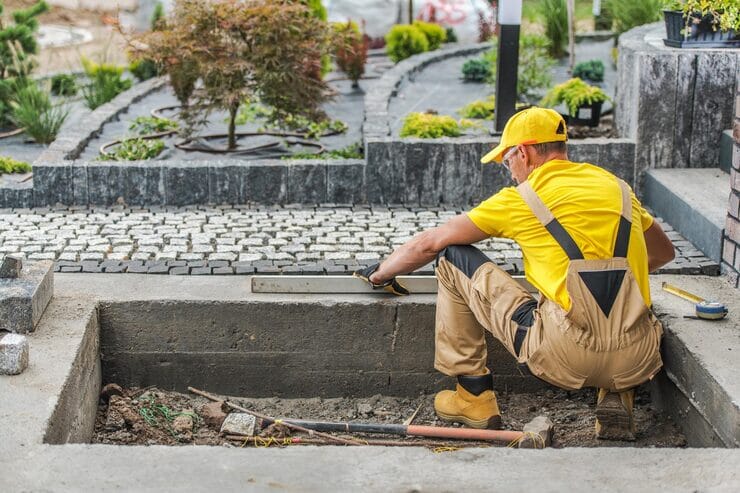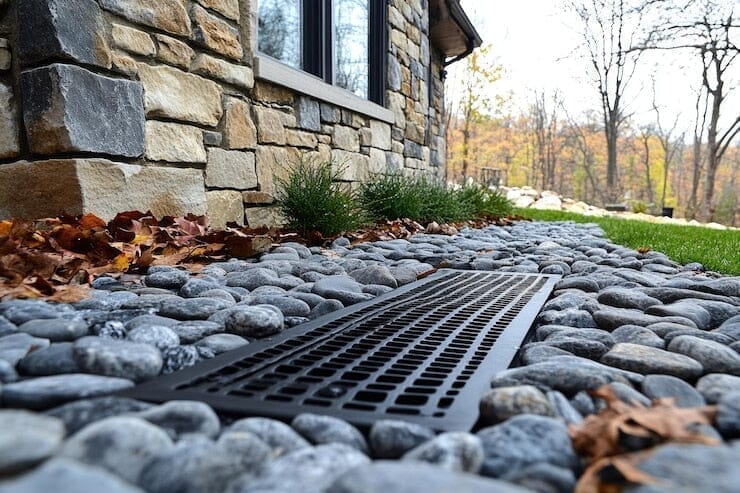Understanding Permeable Pavers: Benefits and Applications
-
10/10/23
-
Vodaland Canada
Permeable pavers provide an effective solution to stormwater management and urban water runoff. These paving materials are eco-friendly and are a way to reduce water pollution and control flooding while promoting sustainable development.
Keep reading to learn about the benefits and applications of permeable pavers, shedding light on why more cities, businesses, and homeowners are embracing this environmentally responsible landscaping choice.
What Are Permeable Pavers?

Permeable pavers are a type of pavement material designed to allow water to pass through it. Unlike traditional impervious surfaces like concrete or asphalt, permeable pavers have void spaces that enable rainwater to infiltrate into the underlying soil.
These pavers are made up of various materials, such as concrete, plastic, clay, and gravel, which are arranged in a way that creates gaps or pores between them. The arrangement of these materials can vary depending on the specific design and intended application.
How Do Permeable Pavers Work?
Permeable pavers work by utilizing the concept of infiltration, which allows rainwater to pass through the paved surface and into the underlying soil. The key components that enable this process are the void spaces between the pavers and the base layers beneath them.
When rainwater falls onto a permeable pavement surface, it is guided through the gaps between the pavers. These void spaces can be filled with aggregate materials like gravel or sand, which act as a filter, removing debris and pollutants from the water as it passes through.
Beneath the paver surface, there is a layer of compacted aggregate known as the base. This layer provides structural support for the pavers and allows water to move freely within it. Underneath the base is typically an additional layer called a reservoir layer. This reservoir layer temporarily stores excess water during heavy rainfall events until it can properly infiltrate into the ground.
The permeability of these pavers depends on various factors such as material composition, joint spacing, and overall design. Properly designed permeable paver systems can typically handle significant amounts of rainfall without causing standing water or run-off issues.
What Are the Benefits of Permeable Pavers?
Stormwater Management
One of the primary benefits of permeable pavers is their ability to manage stormwater effectively. Traditional impervious surfaces, such as concrete or asphalt, prevent rainwater from seeping into the ground, leading to excessive runoff and increased flooding risks.
Permeable paving stones allow rainwater to infiltrate the porous surface, reducing stormwater runoff and its associated problems.
Pollution Reduction
Permeable pavers play a crucial role in controlling water pollution. As rainwater passes through the pores in these pavers, it undergoes a natural filtration process that helps remove pollutants and harmful substances before they enter groundwater resources and local water bodies. This feature significantly improves water quality by minimizing sedimentation, nutrient contamination, and the spread of chemical pollutants.
Groundwater Recharge
By facilitating rainwater infiltration into the soil beneath, permeable pavers contribute to recharging groundwater levels. In urban areas where impervious surfaces dominate, groundwater recharge becomes challenging due to limited percolation opportunities.
Permeable pavers help replenish underground water sources by allowing water to replenish aquifers rather than being lost as surface runoff.
Reduced Heat Island Effect
The heat island effect refers to the elevated temperatures experienced in urban areas due to the excessive retention of heat on hard surfaces like concrete or asphalt. Permeable pavers can mitigate this effect by allowing heat dissipation through evaporation and reducing surface temperatures. Using light-coloured permeable materials further aids in reflecting sunlight instead of absorbing it.
Increased Site Compatibility
Permeable pavers provide versatility across different environments as they can be installed on various terrains and gradients. They adapt well to both commercial and residential landscapes due to their interlocking feature that ensures stability while accommodating the natural movement of the ground below.
Enhancing Aesthetics
In addition to their functional benefits, permeable pavers also enhance the visual appeal of outdoor spaces. With a wide range of designs, colours, shapes, and sizes available, they allow for creativity and customization. These pavers can be integrated into various settings, from driveways and sidewalks to patios and plazas, while providing an attractive alternative to traditional paving materials.
Applications of Permeable Pavers
Residential Areas
Homeowners can incorporate permeable pavers into their driveways, walkways, patios, and pool decks to reduce stormwater runoff on their properties. The enhanced water management also helps prevent erosion in garden beds and lawns.
Commercial Developments
Permeable pavers are suitable for various commercial applications such as parking lots, pedestrian plazas, retail centers, and commercial driveways. Implementing these pavers not only improves water drainage but also demonstrates environmental responsibility and sustainability initiatives.
Urban Landscaping & Streetscapes
Cities and municipalities can benefit immensely from using permeable pavers on streetscapes, sidewalks, park pathways, and public spaces. Incorporating them into urban landscapes reduces the impact of heavy rainfall events by promoting drainage systems that can handle large volumes of surface runoff.
Green Infrastructure Projects
Permeable pavers play a vital role in green infrastructure projects aimed at mitigating stormwater issues caused by urbanization. They are often used as part of rain gardens or bioretention areas where multiple infiltration techniques help mitigate flooding risks.
Waterfront Areas
Coastal communities can utilize permeable pavers along waterfronts or in marina areas to prevent pollutants from reaching surrounding bodies of water while allowing water to drain efficiently.
Get Quality Permeable Pavers
Permeable pavers offer numerous advantages in terms of stormwater management, pollution reduction, groundwater recharge, heat island effect mitigation, site compatibility, and aesthetic appeal.
From residential properties to commercial developments and urban landscapes, the applications of permeable pavers are diverse.
By embracing these innovative paving solutions, individuals and communities can actively contribute to creating more sustainable environments while enhancing the beauty and functionality of their outdoor spaces.
If you’re interested in high-quality permeable paving solutions, our team at Vodaland is here to help. We offer a variety of options that are perfect for your home or commercial space. Contact us today at (905) 238 1771 to learn more about what we have to offer.














